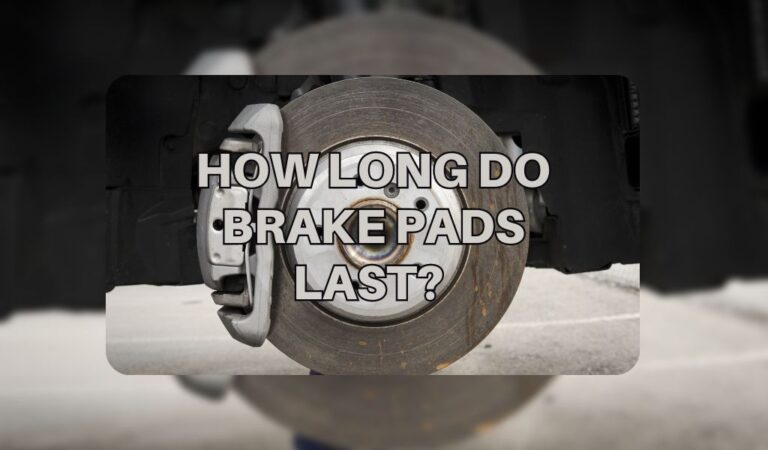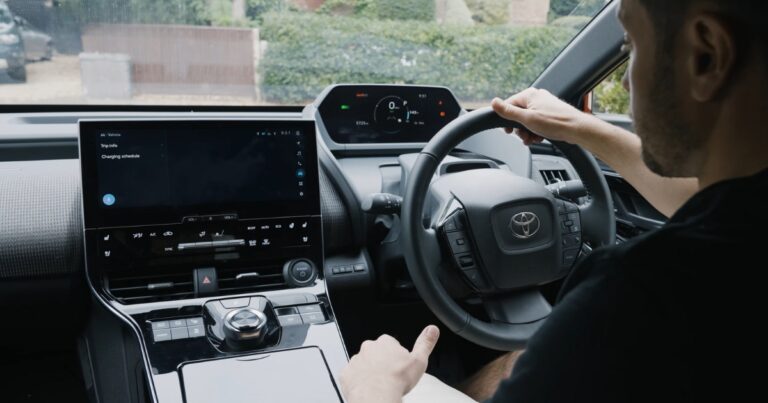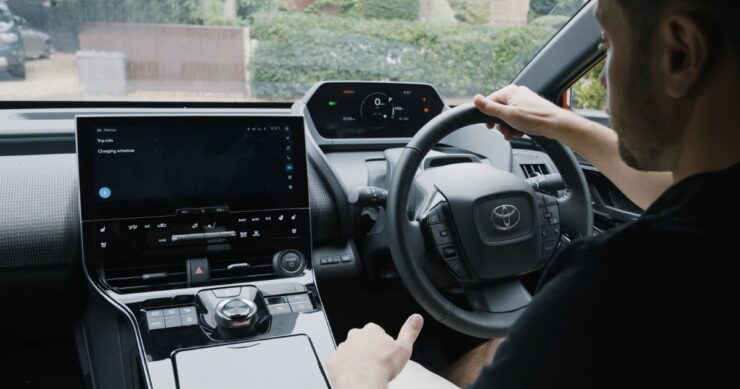Brake pads must be maintained every 25,000 to 65,000 miles in general, whereas rotors must be changed every 30,000 to 70,000 miles. Therefore, based on driving situations and styles, the actual figure may vary.
The excellent thing is that when the brake pads are approaching the end of their lifespan, you will likely notice favorable signs, making analysis and repair simple.
But how can you tell whether your brake pads need to be replaced? What are the functions of brake discs? Let’s take a deeper look over how, what, as well as why you should replace your car’s brake pads.
What Are Brake Pads and What Do They Do?
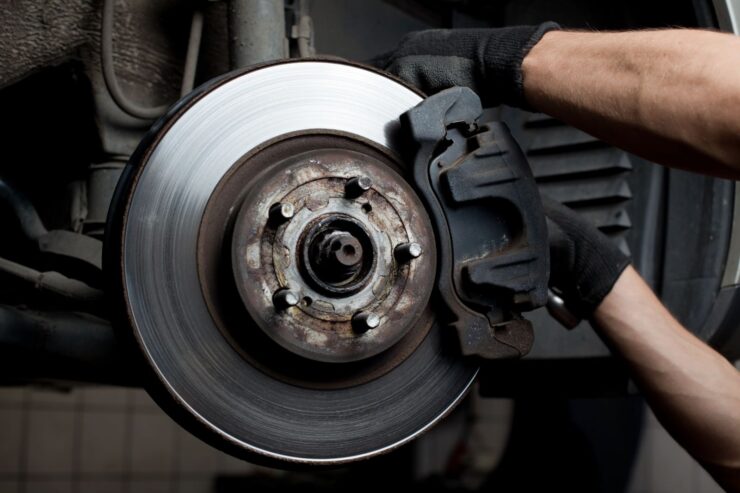
Brake pads are placed between the disc brake and the brake pedal and are an essential part of your car’s safety system. When you apply pressure on the pedal, the braking caliper applies pressure to the disc brakes which in turn slows down the tires.
Other components of your safety system, including brake discs, calipers, and, might soon wear out if your brake pads aren’t working correctly. It’s critical to keep your brake pads in good working order to avoid costly repairs and dangerous driving situations. That is why it is vital to know when and how to update your vehicle’s worn-out brake pads.
What Causes Brake Pads to Fail?
The explanation is straightforward: friction. Recall that the tension between the disc brake as well as the brake rotor is what stops your car down. When your disc brakes continually rub against your blades, they begin to wear away with time.
What Tends To Happen Whenever The Brake Pads Fail?
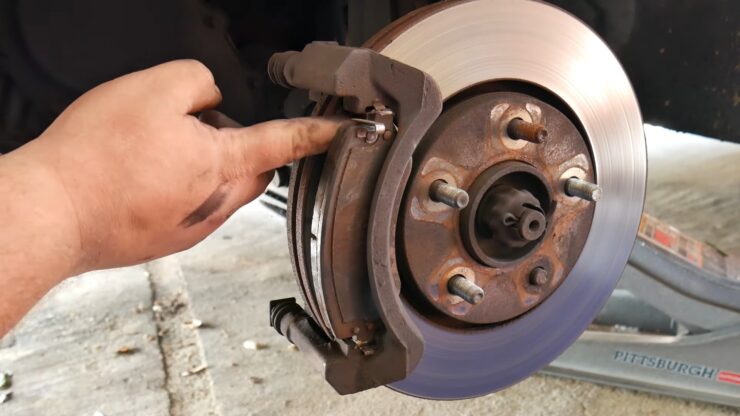
You cause minuscule amounts of excessive wear on your brake pads when you apply the brakes to your automobile. This resistance wears away minimal quantities of the braking pad’s outer covering for each kind of braking system: porcelain, natural, and metal. This degradation accumulates over time, and as your disc brakes become narrower, they will ultimately need to be changed.
Here are several indicators that it’s time to replace your brake pads:
Sounds Of Screeching Or Screaming
The first thing a vehicle will perceive when brakes are used is screeching, shrieking, or whining sounds. This noise is created by a tiny, mechanical shim indication installed in your braking system specifically for this reason.
It’s an opportunity to take your automobile to a brake expert for an examination if you hear it frequently while stopping. A thin layer of dust can get accumulated on the disc brakes after rainfall and generate a similar screaming sound when stopping.
Grunting And Bold Metal Grinding
When you notice a loud, low whirring noise like steel crunching or a growling rumble, it could mean that the brake pads have eroded or your braking discs and calipers have made contact as well.
If you notice this sort of noise, you must take your automobile to a service facility as soon as possible because this metallic metal plate can rapidly cause severe damages.
Brake Pad A Little Over A Quarter Inch
One can also examine their brake pads manually to see if they need to be updated. If you look via your tire sprockets, your brake pad must be crushed towards your brake rotor. You must have your pads checked if the residence is less than 1/4 inch thick (approximately 3 millimeters), mainly if the car hasn’t gone for maintenance in a long period after purchase.
Lights For Indicators
Some automobiles include a led indicator just on the panel whenever it’s necessary to update the brake pads. Examine your instruction booklet to discover if your car has a low-pad monitoring system installed. If the light does turn on, note that your technician will need to repair the sensor module and the disc brakes.
How Long Do Brake Pads Work?
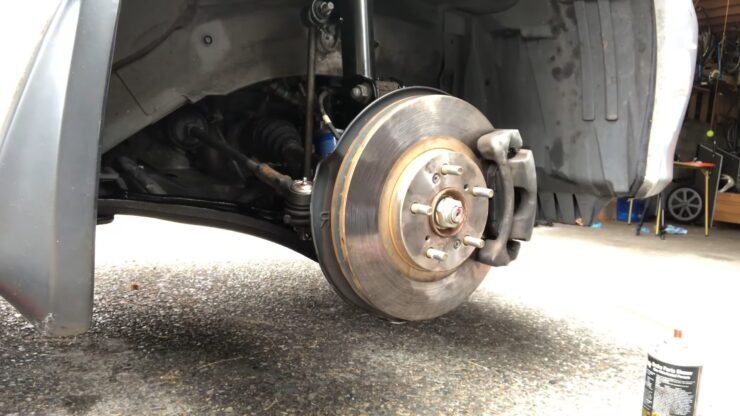
There isn’t a typical response to this issue. According to many vehicle companies, a brake pad could last somewhere between 20,000 to 70,000 miles. Yet, many vehicle owners repair their brake discs after 40,000 miles on aggregate. Several variables can influence how long your brake pads last:
Patterns of Riding
Let’s imagine you’re traveling at 70 miles per hour on the freeway when the automobile next to you abruptly starts to slow down. You’re going to slam on the brakes hard to force oneself to a stop immediately, correct?
Brake pads can be severely damaged in situations like this. When you’re driving quickly and abruptly press the brakes, it takes a lot of braking power to bring your automobile to a standstill. Excessive brake wear is a typical result of this.
The Transmission Mode
You may prolong the life of your brake lines if you do have the correct mechanism. While decelerating, vehicle owners with manual gearbox units don’t rely exclusively on brake pads. Without using their disc brakes and burning them down, they can slow down by upshifting gears, known as engine braking.
The Different Types Of Brake Pads
The brake pads’ category users utilize significantly impacts how long they will last. There seem to be three primary varieties of brake pads, each with its own set of materials.
• Organic brake pads get the shortest lifespan of the three varieties and are more susceptible to brake fade.
• Porcelain pad car brake units are featured in luxury vehicles and are designed to provide a smooth braking experience.
• Semi-metallic brake pads are designed for high efficiency and have a considerably better braking reaction than organic brake pads.
Your Driving Situation
Although you may not realize it at first, wherein you reside has a significant impact on the life of your brake pads. The brakes require greater force for stopping the car on sloppy routes of mountains than on the plain roads. Even typical heavy traffic scenarios can wear down your disc brakes.
FAQ
How do I know when it’s time to replace my brake pads?
As mentioned in the article, some signs that indicate it’s time to replace your brake pads include screeching or screaming sounds, grunting and bold metal grinding, a brake pad thickness of less than 1/4 inch, and indicator lights. It’s important to get your brake pads checked regularly by a professional to ensure they’re in good working order.
Can I replace brake pads myself?
Replacing brake pads can be a complex process, and if not done correctly, it can be dangerous. It’s recommended to have a professional mechanic replace your brake pads to ensure they’re installed correctly and your brakes are functioning properly.
How often should I have my brake pads checked?
It’s recommended to have your brake pads checked at least once a year or every 12,000 miles. However, if you notice any signs of wear or unusual sounds, it’s best to have them checked immediately.
What are the different types of brake pads?
There are three primary types of brake pads: organic, ceramic, and semi-metallic. Organic brake pads have the shortest lifespan and are more susceptible to brake fade. Ceramic pads are often found in luxury vehicles and provide a smooth braking experience. Semi-metallic brake pads are designed for high efficiency and have a considerably better braking reaction than organic brake pads.
How long do brake pads typically last?
The lifespan of brake pads can vary based on driving habits, type of brake pads used, and other factors. Generally, brake pads can last anywhere from 20,000 to 70,000 miles, but it’s important to have them checked regularly by a professional to ensure they’re in good working order.
Can driving style affect the lifespan of brake pads?
Yes, driving style can have a significant impact on the lifespan of brake pads. Frequent hard braking or driving in hilly areas can cause more wear and tear on your brake pads, while gentle driving can help extend their lifespan. It’s important to be mindful of your driving habits and adjust accordingly to help prolong the life of your brake pads.
How much does it cost to replace brake pads?
The cost of replacing brake pads can vary depending on the type of vehicle you have and the type of brake pads used. Generally, the cost can range from $100 to $300 per axle. It’s important to get a quote from a professional mechanic to get an accurate estimate for your specific vehicle.
Conclusion
A variety of elements influences brake pad lifetime. And fortunately, some aspects, such as your driving style, are something you can control. That just being stated, inspect your brake pads regularly and update them with a decent set if necessary. Do we hope that you have got an idea of how long do brake pads last?
Related Posts:
- How Long Do Car Batteries Last in Toyota Cars? - Rev…
- How to Reset Viper Alarm - Unlock the Secrets
- Toyota's Creativity Overtakes Their Right-Hand Drive…
- How Long Does an Oil Change Take? - From Quick Pit…
- How Long Does It Take to Rotate Tires? - Saving Time…
- How Long Is a Subaru Outback? From Exterior Length…

